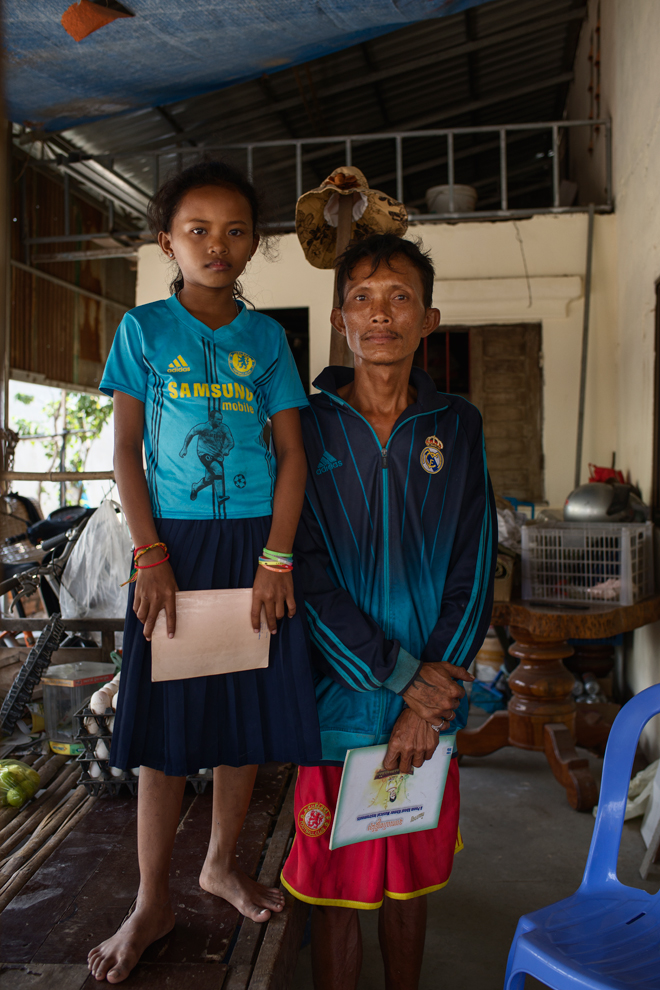
The Indochina Starfish Foundation provides poor children with opportunities to read outside school. VICTORIA MØRCK MADSEN
While Cambodia has relatively low rates of reading, NGO Indochina Starfish Foundation is helping impoverished children and their parents by providing free libraries at four locations around Stung Meanchey
A th Oeun and his 11-year-old daughter, Sun Chanda, are sitting crossed-legged on a concrete floor, pouring over a book packed with colourful pictures and text in Khmer.
“Children come here to read, and people like me, who collect rubbish, can use the books and relax,” he says.
Oeun is one of thousands of adults and children, who scrape a living collecting rubbish around Phnom Penh’s Stung Meanchey district, an area notorious for a vast stinking garbage dump which, until it was closed in 2009, was swarming with locals scavenging for anything of value.
Today, though, the 39-year-old is making use, along with other parents and children, of one of four community libraries set up in the area by ISF (Indochina Starfish Foundation), an NGO which helps impoverished children catch up on missed schooling.
“If I come across any books when I’m out collecting rubbish, I always give them to the library,” says Oeun, who, unlike many local parents, doesn’t send his daughter out to collect discarded items that can be sold.

A range of Khmer-language books are available at the Stung Meanchey libraries. VICTORIA MØRCK MADSEN
“Chhanda only goes to school, and studies English at classes provided by an NGO,” he says.
This library was started 12 months ago in the Stung Meanchey home of former policeman and schoolteacher Neou Thong, 68, who has added an extra room to his modest house to accommodate his fast-growing collection of books.
“Anyone from the community can come here and borrow something to read,” he says.
Thong also operates a mobile library from his Honda motorbike, which he loads with books, to encourage the wider community to get into the reading habit.
“I take books to popular places like coffee shops and pagodas, to encourage people to start borrowing them,” he says. “Often, people are suspicious and think I want money.
They take quite a bit of persuading that, in fact, they can borrow the books for free.”

Neou Thong. VICTORIA MØRCK MADSEN
As well as scores of titles for children, Thong’s library, funded by ISF, contains books about Cambodian history, health, hygiene, the Buddhist religion and finding work.
A group of women are sitting around and discussing an open copy of the facility’s most popular volume – an illustrated guide to reproduction and childbirth.
“Only a small percentage of books borrowed from this library are read for pleasure,” Thong says. “The majority are for information.”
ISF started the four community libraries in Stung Meanchey, and another in Chbar Ampov district, because their experience of educating children showed that students got into the reading habit much more quickly if there was a culture of reading at home.
“We discovered that if we only worked with the pupils, and didn’t encourage their parents to read at the same time, the chain of success was markedly reduced,” says ISF country director Chourp Vicheka.
The task is made more difficult, however, due to a shortage of literature written in Khmer, especially writing for children.

The most popular book in the Stung Meanchey libraries is about family planning. VICTORIA MØRCK MADSEN
“We like to change the books often, to keep the children interested, but we struggle to find new titles,” she says, standing in the library of one of two schools ISF runs, which are helping about 550 poor children fill gaps
in their education and re-enter state schools.
A lack of books in Khmer may go some way to explaining why Cambodia scores badly compared to other developing countries when it comes to how often children read.
In a study on reading habits among school-aged students published in August last year by Stanford University and NGO Room to Read, only 10 per cent of school-age children in Cambodia said they read independently every day, compared to 19 per cent in South Africa and 33 per cent in Nepal.
Similarly, only 4 per cent of Cambodian children said they had read with siblings in the past week, compared with 12 per cent in South Africa and 22 per cent in Nepal.
Room to Read country director for Cambodia Kann Kall blames the problem on Cambodia’s political history.

Ath Oeun (right) with daughter Sun Chanda. VICTORIA MØRCK MADSEN
“During the colonial period, most people didn’t go to school and knowledge was transferred orally,” he says.
“But after independence, in the 1960s, there was an increasing amount of literature available and readers to consume it.” But that all came to an abrupt end in the mid-1970s.
“When the Khmer Rouge came to power, they shut schools, burnt books, murdered writers, and there were virtually no publications apart from propaganda until as late as 1989,” Kall says, adding that an entire generation was turned off reading.
“Anyone born in the ’80s or ’90s was not exposed to books, and when you don’t have reading material, there is a natural tendency not to read,” he says. “It’s a vicious circle.”
Back at the community library, Neou Thong is passionate about the potential benefits to his friends and neighbours of picking up a book.
“I say to people who come here: ‘You don’t have land and you don’t own a house, so the only real option for you and your children to make your lives better is education.’ And that is why I run this library.”
Contact PhnomPenh Post for full article
Post Media Co LtdThe Elements Condominium, Level 7
Hun Sen Boulevard
Phum Tuol Roka III
Sangkat Chak Angre Krom, Khan Meanchey
12353 Phnom Penh
Cambodia
Telegram: 092 555 741
Email: [email protected]









